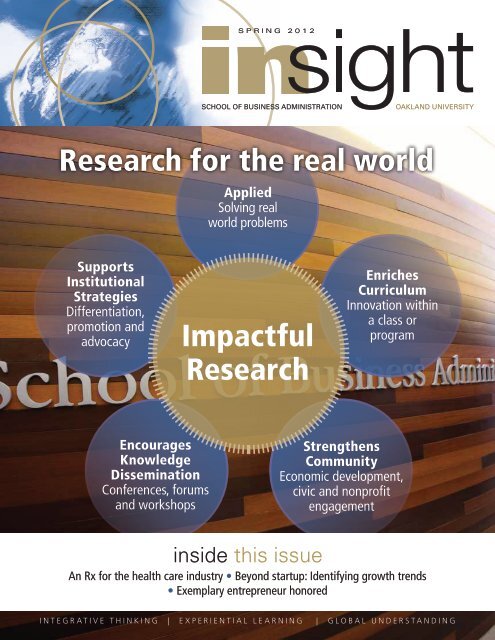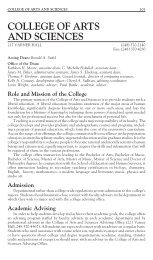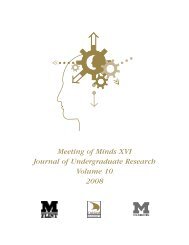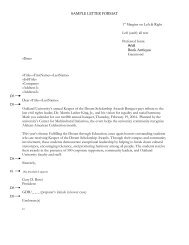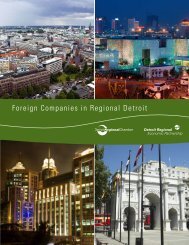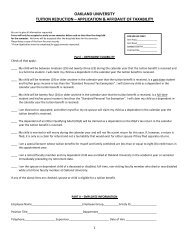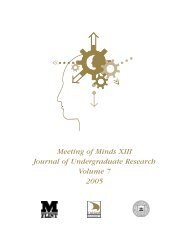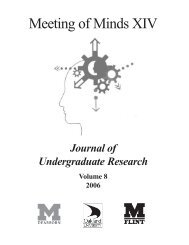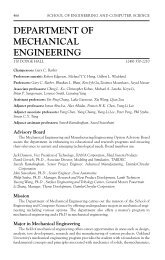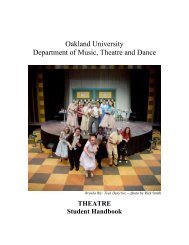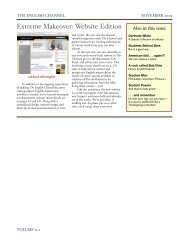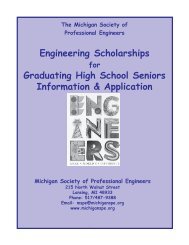Spring 2012 - Oakland University
Spring 2012 - Oakland University
Spring 2012 - Oakland University
Create successful ePaper yourself
Turn your PDF publications into a flip-book with our unique Google optimized e-Paper software.
<strong>Spring</strong> <strong>2012</strong><br />
School of Business Administration<br />
<strong>Oakland</strong> <strong>University</strong><br />
Research for the real world<br />
Applied<br />
Solving real<br />
world problems<br />
Supports<br />
Institutional<br />
Strategies<br />
Differentiation,<br />
promotion and<br />
advocacy<br />
Impactful<br />
Research<br />
Enriches<br />
Curriculum<br />
Innovation within<br />
a class or<br />
program<br />
Encourages<br />
Knowledge<br />
Dissemination<br />
Conferences, forums<br />
and workshops<br />
Strengthens<br />
Community<br />
Economic development,<br />
civic and nonprofit<br />
engagement<br />
inside this issue<br />
An Rx for the health care industry • Beyond startup: Identifying growth trends<br />
• Exemplary entrepreneur honored<br />
Integrative Thinking | Experiential Learning<br />
| Global Understanding
<strong>Oakland</strong> <strong>University</strong> | School of Business Administration<br />
SPRING <strong>2012</strong><br />
SBA strategy encourages impactful research<br />
Health care’s helping hand<br />
in this issue<br />
1 Health care’s helping hand<br />
2 Passion for economics leads to<br />
Harvard Business Review<br />
3 Professor’s persistence offers insight into<br />
impact of accounting practices<br />
4 Faculty-guided research prepares students for<br />
real-world challenges<br />
5 Exemplary entrepreneur receives honorary<br />
doctorate degree from SBA<br />
6 Research professor shines national spotlight<br />
on SBA<br />
SBA Insight is published two times per year. It<br />
is distributed free of charge to OU’s School of<br />
Business Administration alumni, staff, partners<br />
and friends.<br />
Reproduction without permission is prohibited.<br />
<strong>Oakland</strong> <strong>University</strong> is an equal opportunity and<br />
affirmative action institution.<br />
Executive Staff<br />
Mohan Tanniru, dean<br />
Balaji Rajagopalan, associate dean<br />
Michael Silverstein, development director<br />
Editorial Staff<br />
Claudette Zolkowski, editor<br />
Frank Fisher, art director<br />
Rick Smith, photographer<br />
Message from the Dean<br />
At the SBA, we believe the research conducted here should meet<br />
the needs of multiple stakeholders within the academic community,<br />
impact the institution and its stakeholders, and support surrounding<br />
businesses and organizations<br />
In academia, we often talk about applied research or linking theory<br />
to practice. This refers to the application of research methodologies<br />
in solving real-world business problems and ensuring students apply<br />
what they learn in the classroom to a practical problem.<br />
Often, the quality of applied research is measured by the number of published works by faculty<br />
members in high-quality, peer-reviewed journals and other outlets such as books, conference<br />
presentations and consulting engagements. Within OU’s SBA, our faculty members continue to<br />
publish articles in many highly respected journals, and partner with businesses to identify and<br />
solve problems through research. We are also dedicated to ensuring that our graduates have many<br />
opportunities throughout their education to apply what they learn in the classroom in real-life<br />
settings. Our experiential learning focus with several non-curricular activities (see the Fall 2011<br />
issue) provides ample evidence in this effort.<br />
Beyond publication and student engagement, the scholarly activity of our faculty members<br />
is touching many other areas important to the growth of our curriculum, our institution and<br />
our region. In our view, research can have a greater impact on the institution if it can be used<br />
systematically to explore such opportunities.<br />
There simply isn’t enough room in this issue to showcase all the meaningful research activity<br />
underway in the SBA. So, in this issue of SBA Insight we offer a selection of articles featuring<br />
the work of a few of our faculty members. You’ll read about how this work is solving real-world<br />
problems, strengthening the economic development of our region and enhancing the SBA’s<br />
reputation in the business world through publication and recognition in highly respected journals.<br />
Though not featured in this issue, other research our faculty members are conducting is making an<br />
impact in significant areas, including:<br />
g The development of cross-curricular programs that strengthen the education of all OU<br />
students through innovative programs. For example, strong faculty research has led to the creation<br />
of the SBA’s new entrepreneurship minor and Ideas 2 Business Lab that is open to all OU students;<br />
and along with faculty from OU’s School of Engineering and Computer Science and School of<br />
Education and Human Services, successfully introduced the energy management certificate<br />
program; and the ongoing development of the university’s lean management program.<br />
g Contributing to the strong future of the university in support of institutional strategy. For<br />
example, members of our marketing faculty are leading a branding research project to support<br />
OU’s growth on the national stage, while faculty members from our Finance and Accounting<br />
Department have provided expert analysis to help guide the university’s financial future.<br />
g Sharing the research of SBA and other faculty with various constituencies to further the<br />
knowledge creation and dissemination, as well as allow networking among academic and<br />
business professionals. For example, in the last year alone, the SBA has hosted conferences,<br />
workshops and forums to bring researchers and practitioners from around the world together<br />
to engage in constructive dialogue on information systems/technologies (AMCIS 2011), credit<br />
analysis and risk management (credit conference), the future of automotive marketing (marketing<br />
forum) and an historical perspective on economic cycles (Gorlin Lecture).<br />
Viewing this activity through the SBA’s lens of Excellence through Integration you can see the<br />
magnitude of the impact our leading business researchers are making when they integrate their<br />
research in support of multiple stakeholders. SBA students, alumni and business partners, the<br />
institution itself, and regional businesses and organizations all gain.<br />
Dr. Mark Isken can’t help helping.<br />
The associate professor of management information<br />
systems for <strong>Oakland</strong> <strong>University</strong>’s School of Business<br />
Administration offers his assistance even when he<br />
walks into a colleague’s classroom.<br />
“He would come into the ATiB lab and see a problem<br />
written on the board,” explains Jerad Wolfrum, SBA<br />
’07, an accounting major with a minor in Applied<br />
Technology in Business (ATiB). “He’d say, ‘I have had<br />
some experience with this. Do you mind if I help?’<br />
He’d then show us how to solve it. He was a big<br />
influence on a lot of us in the ATiB program.”<br />
Wolfrum says Isken also was quick to advise him on<br />
his ATiB project that had him creating an information<br />
technology program to solve a scheduling hiccup for<br />
General Motors. “Believe it or not, I never had him<br />
as an instructor, but he was always helping me, even<br />
when it came time to pick a graduate school,” he<br />
says. “He gave me lots of advice.”<br />
Isken, an engineer, has made it his life’s work to<br />
develop mathematical models, translate them into<br />
computer programs and solve problems in the<br />
health care industry.<br />
Isken’s free world<br />
What sets his research apart is that he doesn’t just<br />
write a research article on his findings. He creates a<br />
companion website showing others how to use his<br />
model and software for free.<br />
“I’ve always been frustrated<br />
because it’s really hard<br />
to take math from a<br />
general description<br />
in a journal article<br />
and figure out<br />
how to use it. My<br />
goal is to help<br />
bridge that gap,<br />
so I started experimenting with these companion<br />
websites, including hselab.org, so it helps people<br />
get some use out of it,” he says.<br />
Isken’s “free” philosophy is a defining factor of his<br />
research, says Brian Denton, an associate professor<br />
at the Edward P. Fitts Department of Industrial<br />
& Systems Engineering at North Carolina State<br />
<strong>University</strong>, who does similar research.<br />
“This has important implications for at least<br />
two reasons,” Denton says. “First, it allows the<br />
dissemination of knowledge to a greater number<br />
of health care providers than would occur in a<br />
typical research project. Second, because it allows<br />
researchers and practitioners to compare alternative<br />
approaches. Thus, his approach has implications for<br />
research and practice in health care delivery.”<br />
Isken’s latest research has him improving patient<br />
flow in a hospital obstetrical postpartum unit.<br />
Because surgery scheduling and labor inductions<br />
directly impact occupancy, he’s reviewed data and<br />
created a patient flow model that previews the<br />
impact of different scheduling policies. The model<br />
essentially creates scenarios and shows how current<br />
staffing and any proposed schedule change would<br />
handle the unit’s population. The goal is to avoid<br />
overtaxing the staff and create a better healing<br />
environment for the patient.<br />
“I know people are using it,” Isken explains. “It’s<br />
been downloaded a couple hundred times, so that’s<br />
good. I also get emails on it — and other models<br />
I’ve shared.”<br />
Health care gets healthier<br />
Iskin started the research in 2009 with a<br />
$15,000 grant he received from Health<br />
Systems Engineering, a company owned<br />
by Tim Ward, now deputy program<br />
director at the Bureau of Medicine and<br />
Surgery (BUMED), the headquarters for<br />
the U.S. Navy’s medical department.<br />
Ward and Isken shared an office while<br />
in graduate school at the <strong>University</strong><br />
of Michigan. At the time, Ward’s<br />
Professor Mark Isken helps students with coursework,<br />
projects and career preparation.<br />
company focused mainly on obstetric services. He<br />
needed something to help ease the nurses’ workload.<br />
Knowing Isken’s expertise, Ward asked him to step in.<br />
Isken first learned to use math models to help the<br />
health care industry as an undergrad at Michigan.<br />
After the summer of his junior year, he interned<br />
with the management engineering department at<br />
William Beaumont Hospital in Royal Oak, Mich.<br />
They hired him and he worked there for seven<br />
years. Beaumont even funded his dissertation,<br />
where he developed staff scheduling optimization<br />
models to help the hospital ensure adequate<br />
staffing while controlling costs.<br />
He created similar projects for Henry Ford Hospital,<br />
and in 1998 joined OU’s School of Business<br />
Administration.<br />
Iskin made the right choice in getting into teaching,<br />
says former student Michael Marks, Operations<br />
Management ’11. “He was hands-down the best<br />
professor I had at OU,” he says. “I would not be the<br />
person that I am if it weren’t for him.”<br />
In fact, Isken helped Marks and Wolfrum get the<br />
interview for their analyst jobs at Improvement Path<br />
Systems, Inc., a health care analytics consulting firm<br />
in Bingham Farms, Mich.<br />
“I want to make an impact,” Isken adds. “I want<br />
to help.” n<br />
By Rene Wisely<br />
Writers<br />
Flori Meeks<br />
Rene Wisely<br />
Mohan Tanniru<br />
Dean, School of Business Administration<br />
<strong>Oakland</strong> <strong>University</strong><br />
1
Insight | SPRING <strong>2012</strong> www.sba.oakland.edu <strong>Oakland</strong> <strong>University</strong> | School of Business Administration<br />
2<br />
Passion for economics leads to Harvard Business Review<br />
Oded Izraeli is searching for the sweet spot.<br />
The professor of economics at <strong>Oakland</strong> <strong>University</strong>’s<br />
SBA has long wondered what amount of inequality<br />
in earnings is good for the so-called “Goldilocks<br />
economy,” one that is not too hot or not too<br />
cold; rather, one that sustains moderate growth<br />
and a low inflation allowing for a market-friendly<br />
monetary policy.<br />
That quest had Izraeli, along with former faculty<br />
member Fuad Hasanov, now an economist with<br />
the International Monetary Fund, digging through<br />
economic data from 48 U.S. states for the census<br />
years 1960 to 2000. They wanted to discover<br />
new evidence of how inequality and growth are<br />
entwined.<br />
After three years, they completed their research.<br />
They found that modest increases can generate<br />
growth, yet heightened inequality may reduce<br />
growth. Furthermore, they argued that policies that<br />
aim for growth but ignore inequality tend to be selfdefeating,<br />
whereas policies that decrease inequality<br />
by, for instance, boosting employment and<br />
education have beneficial effects on an economy.<br />
The write way<br />
They showcased these findings in an article titled<br />
“Income Inequality, Economic Growth, and the<br />
Distribution of Income Gains: Evidence from the U.S.<br />
States.” It was published in the Journal of Regional<br />
Science in August 2011.<br />
Their paper caught the attention of the prestigious<br />
Harvard Business Review. It ran an abstract of the<br />
research this January, tying it in with the Occupy<br />
Wall Street movement, where protesters denounced<br />
“It is an honor ... to be<br />
in there (the Harvard<br />
Business Review). ...<br />
It makes <strong>Oakland</strong> a little<br />
more known in places.”<br />
— Professor Oded Izrael<br />
the growing income and wealth distribution in the<br />
United States between the wealthiest 1 percent and<br />
the rest of the country’s population.<br />
“The subject is very close to what’s happening in<br />
the real world,” says Izraeli, a native of Israel who<br />
joined OU’s faculty in 1978. “The timing was right.”<br />
Appearing in the Harvard Business Review is<br />
considered a coup for the authors as well as<br />
<strong>Oakland</strong> <strong>University</strong>.<br />
“Yes, it is an honor,” Izraeli says. “It’s very flattering<br />
to be in there. It’s flattering to have their interest<br />
in the Journal of Regional Science piece and then to<br />
publish an abstract in there.”<br />
It’s a shot in the arm for <strong>Oakland</strong> <strong>University</strong> as well,<br />
he says. “Also, <strong>Oakland</strong> doesn’t usually appear in<br />
that publication, so it makes <strong>Oakland</strong> a little more<br />
known in places that do not know about it already.”<br />
A collaborative effort<br />
The success of the study and subsequent paper was<br />
ignited by working as a team, says Hasanov.<br />
“When we were discussing the project, you<br />
could sense the synergy,” he says. “We<br />
had a lot of fun.”<br />
For his next project, Professor Oded Izraeli (left)<br />
is collaborating with Professor Kevin Murphy to<br />
examine the MEAP scores of Michigan charter and<br />
public schools.<br />
Izraeli agrees. “Two heads are better than one<br />
because when you have an idea, you can bounce<br />
ideas off of each other,” he adds.<br />
Izraeli, who earned his bachelor’s degree at the<br />
Hebrew <strong>University</strong> and his master’s and doctorate<br />
at the <strong>University</strong> of Chicago, has moved on to his<br />
next research project, again a collaboration. He<br />
and Professor Kevin Murphy of OU’s Department of<br />
Economics are examining Michigan charter schools<br />
and how their MEAP scores compare to public<br />
schools.<br />
If the Harvard Business Review comes knocking<br />
again, he’s ready. “It’s not something you plan, but<br />
the opportunity would be very nice to have,” he said.<br />
Besides being in the Harvard Business Review,<br />
Izraeli has published scholarly articles in journals<br />
such as: Journal of Urban Economics, Urban<br />
Studies, Regional Studies, Journal of Environmental<br />
Economics and Management, Economic<br />
Development and Cultural Change, Transport<br />
Economic and Policy, Logistics and Transportation<br />
Review, and the Annals of Regional Science.<br />
His areas of interest are urban and regional<br />
economics, state and local public finance,<br />
environmental economics and labor economics. His<br />
specialties include interstate differences in state<br />
and local revenues, trade-off between environment<br />
quality and jobs, interstate equity implications of<br />
the 1986 tax reform, the effect of state governor<br />
party affiliation on state economic performance,<br />
convergence in state per capita income, and the<br />
comparison of the impact of the environment on<br />
earnings and housing values over time.<br />
“I’ve always had an interest in the social sciences<br />
and how society is working,” Izraeli says, explaining<br />
his passion for economics. “The economic aspect of<br />
it has always been fascinating to me.”<br />
Izraeli has found his sweet spot. n<br />
By Rene Wisely<br />
Professor’s persistence offers insight into impact of accounting practices<br />
Seong-Yeon Cho, assistant professor of accounting,<br />
can relate to the thousands of attempts Thomas<br />
Edison made to develop a working light bulb.<br />
While Cho hasn’t duplicated Edison’s experiences,<br />
the capital market researcher has hit his share of<br />
brick walls — and his perseverance has resulted in<br />
some memorable “aha!” moments.<br />
He achieved one during his recent research on<br />
earnings management and deregulation, based on<br />
the example of the 1970s-era trucking industry.<br />
After extensive research — and a few moments of<br />
discouragement — Cho proved his theory that in<br />
their attempt to dissuade the U.S. government from<br />
implementing deregulation, trucking companies<br />
were manipulating data to falsely indicate they were<br />
losing money.<br />
“I was considering giving up when I had the<br />
breakthrough,” Cho says. “That’s the beauty of<br />
doing research.”<br />
The findings of Cho’s project with co-researcher<br />
Kevin D. Sachs of City <strong>University</strong> of New York,<br />
“Earnings Management and Deregulation: The Case<br />
of Motor Carriers,” will be published this spring in<br />
the Journal of Accounting and Public Policy.<br />
Cho has been published in a number of refereed<br />
journals, including Accounting Horizons and Journal<br />
of Financial Intermediation, and has presented<br />
co-authored papers at national, regional and section<br />
meetings of the American Accounting Association.<br />
A different perspective<br />
Cho earned a bachelor’s degree in accounting and a<br />
master’s degree in operations research from Yonsei<br />
<strong>University</strong> in his native South Korea.<br />
From there, he worked in database management for<br />
the statistics department at the Bank of Korea, the<br />
central bank of South Korea. He later became the<br />
bank’s senior economist, where he recalls thinking,<br />
“there has to be more sophisticated methods for<br />
analyzing the economy.”<br />
Hoping to find better tools to excel in his job, in<br />
1999 Cho traveled to the U.S., where he earned a<br />
second master’s degree in economics from the<br />
<strong>University</strong> of Rochester (N.Y.) and a Ph.D. in<br />
accounting from the State <strong>University</strong> of New York at<br />
Buffalo.<br />
He returned to the Bank of Korea briefly, but “felt I<br />
could contribute more by doing research,” he says.<br />
A new path<br />
He joined the SBA in 2007 after holding faculty<br />
positions at Tulane <strong>University</strong> and Drexel <strong>University</strong>.<br />
“We have very good colleagues in the SBA. You can<br />
bring anything to your colleagues, and they will be<br />
very helpful,” he says.<br />
Cho is especially interested in exploring how the<br />
management of accounting numbers can affect<br />
decision makers, from investors to governments.<br />
“Accounting is always subject to some kind of<br />
biases,” he says. Cho focuses on three main areas:<br />
earnings management, disclosure and corporate<br />
governance.<br />
Deregulation dangers<br />
Deregulation, his recent research topic, is a timely<br />
subject. There has been talk of deregulating oil and<br />
gas, banking and health care. “We need some<br />
wisdom about what’s happening when we do that,”<br />
Cho says.<br />
The example of the 1970s trucking industry can<br />
provide insight. Prior to deregulation, publicly traded,<br />
federally regulated trucking companies were<br />
guaranteed a monopolistic profit, and they were not<br />
enthusiastic about changing. “They lobbied fiercely<br />
against deregulation by the government,” Cho notes.<br />
Lobbyists argued that deregulation — and the<br />
resulting competition — would come as a blow to<br />
an industry that already was suffering financially.<br />
And they provided the numbers to back up their<br />
case. The deregulation eventually went forward, but<br />
Cho remained interested in the evidence the<br />
trucking industry presented.<br />
In his research, Cho found that evidence in the<br />
Library of Congress, then used statistical methods to<br />
track the trucking companies’ earnings based on the<br />
work they reported at that time. His methods<br />
backed up his theory: The trucking companies were<br />
not experiencing a decrease in earnings.<br />
There is no reason to believe that what happened<br />
then couldn’t happen again, Cho adds. “When we<br />
deregulate certain industries, we should consider<br />
the potential for earnings management.”<br />
New era for auditors<br />
Another research focus of Cho’s zeros in on the<br />
wisdom of utilizing accounting firms that offer<br />
auditing and non-auditing services.<br />
In his study with Jongsoo Han of Rutgers Business<br />
School-Camden and Kevin F. Brown of Wright State<br />
<strong>University</strong>, Cho found auditors can provide some<br />
services, such as income tax return preparation,<br />
without it interfering with the integrity of their<br />
auditing. The way they approach the taxes would be<br />
influenced by need to comply with Internal Revenue<br />
Service laws.<br />
There was a time when it was common for<br />
accounting firms to combine services for corporate<br />
clients. The Enron scandal in 2002 demonstrated<br />
this approach could impact the auditors’<br />
impartiality. From there, the pendulum swung to the<br />
other extreme, and the common perception was that<br />
auditors should not provide any non-auditing<br />
services whatsoever.<br />
Today, there does not seem to be a negative<br />
connotation associated with allowing an auditor to<br />
receive fees for some services.<br />
The key, Cho says, is to consider the kind of service<br />
the auditor is providing. “Content is more important.”<br />
The researchers presented their findings last<br />
summer at the American Accounting Association’s<br />
annual meeting in Denver. Their report, “Do<br />
Non-audit Services Enhance Value? Evidence from<br />
the Capital Markets,” is under review for<br />
publication.<br />
Pressing forward<br />
Cho has several other projects under consideration<br />
for publication, and he intends to continue his<br />
capital market research. He is confident that more<br />
exciting moments of discovery — findings that can<br />
have regional, state and national implications —<br />
lie ahead. n<br />
By Flori Meeks<br />
Seong-Yeon Cho, assistant professor of accounting,<br />
combines his business and academic experience to<br />
advance his research.<br />
3
Insight | SPRING <strong>2012</strong><br />
www.sba.oakland.edu<br />
<strong>Oakland</strong> <strong>University</strong> | School of Business Administration<br />
Exemplary entrepreneur receives honorary doctorate degree from SBA<br />
4<br />
MBA candidate Danying Xing (left) assisted Associate Professor Nivedita Mukherji and Professor Jonathan Silberman (not pictured) in a project to identify growth<br />
trends in Macomb County.<br />
Faculty-guided research prepares students for real-world challenges<br />
MBA candidate Danying Xing found the transition<br />
from her previous studies in mechanical engineering<br />
to the world of business an exhilarating — albeit<br />
challenging — experience. It was an experience she<br />
enhanced significantly by seizing the opportunity to<br />
join a faculty-guided research project through the<br />
SBA’s Center for Integrated Business Research and<br />
Education (CIBRE) last summer.<br />
For Xing and the other participating SBA students,<br />
the research projects represent a valuable chance<br />
to gain practical insight into the field she hopes<br />
to enter, as well as real-world experience that will<br />
help her thrive in her chosen career. Through the<br />
program, students are assigned to research projects<br />
designed specifically for businesses in the area.<br />
“When you do actual research projects, you get<br />
a sense of how messy they are,” says Nivedita<br />
Mukherji, associate professor, economics. “Students<br />
mostly get these canned projects where the data is<br />
nice and everything works. Real research projects<br />
are not always so well-defined. Experience on these<br />
projects helps the students learn how to frame<br />
questions and collect the necessary data.”<br />
Close to home<br />
Xing, who is in her second year of OU’s MBA<br />
program, assisted OU Professor of Economics<br />
Jonathan Silberman and Mukherji with “Second-<br />
Stage Companies in Macomb County, MI, 2002-<br />
2009.” OU MBA candidate Zachary McKenzie<br />
participated, too.<br />
The project, conducted at the request of Macomb<br />
County, called for identifying county-based,<br />
second-stage manufacturing companies — those<br />
that have progressed beyond the startup stage,<br />
have annual revenues between $1 million and $50<br />
million, and employ between 10 and 100 workers.<br />
The research team was also asked to identify<br />
which manufacturing sectors these second-stage<br />
companies represented.<br />
“The goal was to have a better understanding of<br />
growth trends in the county,” Xing says.<br />
Under Mukherji’s and Silberman’s instruction, Xing<br />
collected data from the U.S. Census Bureau and<br />
identified second-stage companies in Macomb<br />
County, as well as companies in the same sectors in<br />
Michigan and the U.S. for benchmarking purposes.<br />
As a Shelby Township resident — a township<br />
in Macomb County — Xing found the research<br />
fascinating and quite relevant.<br />
“Macomb County is growing, but so is Michigan.<br />
The question was, ‘Is Macomb County doing well<br />
on its own, or is its growth tied in with the state’s<br />
growth?” she explains.<br />
A promising picture<br />
The report presents encouraging news for Macomb<br />
County.<br />
The research uncovered that several manufacturing<br />
sectors in the county — namely transportation<br />
equipment and fabricated metal product<br />
manufacturing — were outperforming the same<br />
sectors at the state and national levels.<br />
The report also lists eight manufacturing sectors<br />
with growth potential that can add value to<br />
Macomb County. They include: wood container and<br />
pallet; metal valve; motor vehicle metal stamping;<br />
other motor vehicle parts; aerospace product<br />
and parts; aircraft engine and engine parts; other<br />
transportation equipment; and military armored<br />
vehicle, tank and tank components.<br />
The report indicates these sectors are noteworthy<br />
since they experienced growth during the 2002-07<br />
economic expansion and continued growing during<br />
the recession.<br />
Valuable insights<br />
Not only did Xing find the research results<br />
interesting, she appreciated being a part of the<br />
research process, from collecting data to analyzing<br />
it, and she recognizes how much the experience has<br />
enhanced her business skills and understanding.<br />
The challenges of the real project offered valuable<br />
learning opportunities.<br />
For example, Xing learned how to work around<br />
limitations of the data available from the U.S.<br />
Census Bureau.<br />
“Those difficulties are a normal element of the<br />
research experience,” Mukherji says. “Finding data<br />
is a huge challenge — as well as learning how to<br />
analyze it.”<br />
The professors guided Xing through the process<br />
of conducting business research. “She was a very<br />
conscientious student,” Mukherji adds. “She gained<br />
an understanding of the research process.”<br />
After graduation, Xing hopes to combine her<br />
bachelor’s and master’s degrees in mechanical<br />
engineering from Shanghai’s Tongji <strong>University</strong><br />
with the knowledge and skills she gains through<br />
her MBA experience at OU to pursue a career in<br />
manufacturing or business analysis. n<br />
By Rene Wisely<br />
<strong>Oakland</strong> <strong>University</strong> recently recognized an<br />
exemplary leader, philanthropist and honorary<br />
alumnus who over three decades has guided the<br />
small business he founded to its current status as a<br />
tier 1 supplier to the automotive, aerospace, solar,<br />
appliance and military manufacturing industries<br />
across the globe.<br />
The School of Business Administration presented R.<br />
Hugh Elliott of Elliott Group International with an<br />
honorary doctorate of science during its December<br />
commencement ceremony. The gesture pays tribute to<br />
the success of Elliott, while emphasizing the quality,<br />
integrity, social responsibility and global and cultural<br />
diversity he emphasizes in the corporate climate.<br />
“A doctorate degree is the recognition of one’s<br />
academic excellence in a chosen field of study,”<br />
SBA Dean Mohan Tanniru says. “By honoring Dr.<br />
Hugh Elliott with the honorary degree, we honored<br />
excellence in his chosen field of endeavor —<br />
business entrepreneurship in a global environment.”<br />
“Given that our school’s mission is to advance<br />
knowledge and enhance students’ abilities to<br />
manage in a global business environment, we could<br />
not have a better role model than Hugh Elliott for<br />
our students.”<br />
A manufacturer of adhesive products used for a<br />
variety of manufacturing purposes, Elliott Group<br />
International maintains product quality that is<br />
consistently used as a benchmark by competitors.<br />
The company’s revenue is estimated at $972 million<br />
this year.<br />
Elliott has given generously to <strong>Oakland</strong>’s School of<br />
Business Administration and Information Technology<br />
building, which bears the names of Elliott and<br />
his wife, Nancy. He also has made a number of<br />
contributions to university athletics programs,<br />
academic scholarships and endowments.<br />
Elliott considers an honorary doctorate degree from<br />
a university he feels so strongly about a dream<br />
come true. It was a joy, he says, for him and Nancy<br />
to see their son Chad graduate from OU in 2007.<br />
“We couldn’t be more excited about the opening<br />
of the <strong>Oakland</strong> <strong>University</strong> William Beaumont School<br />
of Medicine — or the expanding relevance and<br />
successes of the SBA,” says Elliott.<br />
R. Hugh Elliott (center) with SBA Dean Mohan Tanniru (center right) and SBA faculty at commencement.<br />
“In the next five years, I can see <strong>Oakland</strong> <strong>University</strong><br />
becoming the No. 3 or No. 2 university in Michigan,”<br />
Elliott says. “To be part of that is a great feeling.”<br />
Few things could top that sense of satisfaction,<br />
he adds, except possibly the recent recognition<br />
bestowed upon him by the SBA.<br />
“Being honored with the doctorate degree was the<br />
cream on the cake,” he says.<br />
Elliott’s list of honors includes being named as a<br />
finalist for the Ernst & Young Entrepreneur of the<br />
Year Award in Michigan, receiving the Gary D. Russi<br />
Community Service Award, being inducted in the<br />
OU Athletics Hall of Honor, and being named an<br />
OU Honorary Alumnus. He also was bestowed the<br />
honor of “des Chevaliers du Testevin” by the French<br />
government in 1995. n<br />
By Flori Meeks<br />
“We couldn’t be more<br />
excited about the …<br />
expanding relevancy and<br />
successes of the SBA.”<br />
— R. Hugh Elliott
11622<br />
School of Business Administration<br />
Elliott Hall<br />
2200 North Squirrel Road<br />
Rochester, Michigan 48309-4401<br />
Non-Profit Org.<br />
U.S. POSTAGE<br />
PAID<br />
Rochester, Mich<br />
Permit No. 17<br />
SPRING <strong>2012</strong><br />
Research professor shines national spotlight on SBA<br />
Through extensive research into vehicle energy<br />
management, SBA Research Professor Walter<br />
McManus is widely recognized for his leadership<br />
and expertise in the behavioral aspects of<br />
energy transportation.<br />
Recently, McManus collaborated on the report<br />
“Fuel Economy Focus: Perspectives on 2020<br />
Industry Implications,” which predicts the U.S.<br />
auto industry overall would see a 5.3% ($4.7<br />
billion) increase in profits in 2020 if the Obama<br />
administration’s proposed fuel-economy and<br />
emissions standards take effect. The report,<br />
sponsored by Citi Investment Research and<br />
Analysis and Ceres, generated more than<br />
300 news reports nationwide.<br />
A $100,000 grant from The Energy Foundation is<br />
supporting McManus’ research into vehicle<br />
energy management as it relates to federally<br />
mandated fuel efficiency standards to assist in<br />
the development of public policies and strategies.<br />
He is working on tools to help automakers<br />
assign value to new technologies to help drive<br />
their investment decisions in alternative energy.<br />
For details on McManus’ research, read news<br />
stories at oakland.edu/sba. n<br />
SBA welcomes new director<br />
of development<br />
The SBA is pleased to welcome Michael Silverstein as the new<br />
director of development. In this role, he will work closely with<br />
SBA faculty, staff, alumni, friends and partners to lead the<br />
SBA’s development efforts. Silverstein brings an impressive<br />
background that includes positions in the development office<br />
at Wayne State <strong>University</strong> Law School. Prior to WSU, he held<br />
various management roles in Saturn and General Motors. He<br />
has also worked extensively as a fundraising volunteer for<br />
several nonprofit organizations. He holds a bachelor’s degree<br />
from the <strong>University</strong> of Michigan.<br />
Silverstein can be reached via email at silverst@oakland.edu<br />
or by calling (248) 370-2121.<br />
SBA5066_5.12


